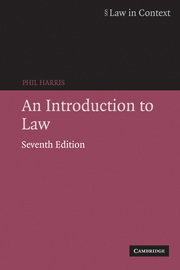Book contents
- Frontmatter
- Contents
- Preface
- Table of statutes
- Table of cases
- 1 Law and society
- 2 Law and morality
- 3 Law and the regulation of economic activity
- 4 Some important legal concepts
- 5 Law and property
- 6 Law and the settlement of disputes
- 7 The making of legal rules
- 8 The European dimension of English law
- 9 Liability in English law: the law of tort
- 10 Liability in English law: crime and the criminal justice system
- 11 The development and the role of the contract
- 12 Law and government
- 13 The legal profession
- 14 The judges
- Index
2 - Law and morality
- Frontmatter
- Contents
- Preface
- Table of statutes
- Table of cases
- 1 Law and society
- 2 Law and morality
- 3 Law and the regulation of economic activity
- 4 Some important legal concepts
- 5 Law and property
- 6 Law and the settlement of disputes
- 7 The making of legal rules
- 8 The European dimension of English law
- 9 Liability in English law: the law of tort
- 10 Liability in English law: crime and the criminal justice system
- 11 The development and the role of the contract
- 12 Law and government
- 13 The legal profession
- 14 The judges
- Index
Summary
In this chapter we examine the relationships between law, society and morality. A society's ‘code of morality’ may be defined as a set of beliefs, values, principles and standards of behaviour, and such codes are found in all social groups. We noted in chapter 1 how the sociologist Emile Durkheim presented a theory of social cohesion, part of which rested on the notion that in technologically undeveloped societies, such as small tribal groups, there tends to be a single, consensually held moral code (the ‘collective conscience’) to which all members of the group subscribe. In a technologically advanced society such as our own, however, with immense differentiation in terms of social status, income, occupation, ethnic background and so on, it is unlikely that we will find such a monolithic moral code. Rather, as will be argued later in this chapter, there is diversity of moral attitudes on all kinds of social and personal issues.
Most of us, if asked to give an example of an area of moral rules in our society, would probably think of sexual morality, or perhaps acts of violence against the person. It is important to emphasise, however, that morality embraces much more than sex and violence; it is part of dominant ideological currents, whereby dominant beliefs and attitudes conducive to the maintenance of the overall status quo are ‘translated’ into a positive general code involving social attitudes to property, politics and social relationships in general.
- Type
- Chapter
- Information
- An Introduction to Law , pp. 26 - 67Publisher: Cambridge University PressPrint publication year: 2006



